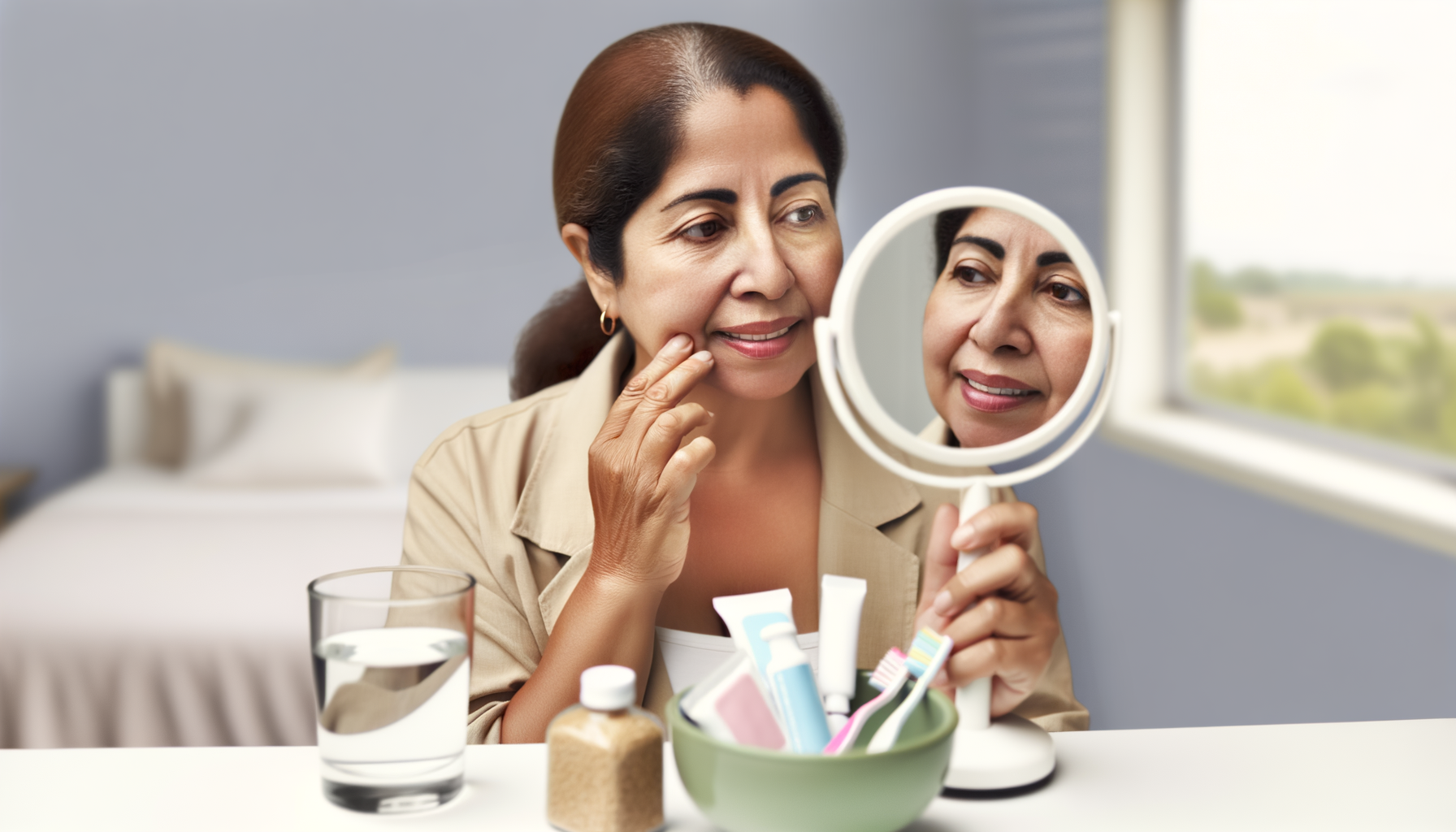Menopause is a natural biological process that marks the end of a woman’s reproductive years, typically occurring between the ages of 45 and 55. It is characterized by the cessation of menstruation for 12 consecutive months. Menopause brings about a host of systemic symptoms due to hormonal fluctuations, particularly a decline in estrogen and progesterone levels. These symptoms can include hot flashes, night sweats, mood swings, sleep disturbances, and changes in weight and metabolism.
Connection Between Menopause and Oral Health
The oral cavity is not immune to the effects of menopause. The decline in estrogen levels has a direct impact on oral health due to the presence of estrogen receptors in the oral mucosa, salivary glands, and bones. This hormonal shift can lead to several oral health issues, such as dry mouth (xerostomia), burning mouth syndrome (BMS), periodontal disease, and changes in taste perception. The reduced estrogen levels can also affect the bones, leading to a decrease in bone density that can compromise the stability of teeth.
Importance of Recognizing Oral Symptoms
Recognizing and addressing oral symptoms during menopause is crucial for several reasons. Firstly, oral health significantly impacts overall health and quality of life. Conditions like dry mouth can increase the risk of dental caries and oral infections, while periodontal disease can lead to tooth loss and has been linked to systemic conditions such as heart disease and diabetes. Secondly, early detection and management of oral symptoms can prevent more severe complications. Lastly, understanding the connection between menopause and oral health empowers women to seek appropriate care and maintain optimal oral hygiene during this transitional phase of life.
Burning Mouth Syndrome (BMS) During Menopause
Symptoms and Areas Affected
Burning Mouth Syndrome (BMS) is a distressing condition often experienced by menopausal women, characterized by a persistent burning sensation in the oral cavity without visible signs of irritation. The primary areas affected include the tip of the tongue, lips, lateral borders of the tongue, and the palate. Symptoms typically manifest with varying intensity throughout the day, often peaking by evening and may include a combination of pain, taste alteration, and changes in salivation.
Types of BMS and Their Characteristics
BMS can be classified into three types based on symptom patterns:
- Type 1 BMS: Symptoms are absent upon waking but intensify as the day progresses. This type is not directly related to psychiatric conditions.
- Type 2 BMS: Characterized by constant pain that persists throughout the day and night, often associated with anxiety.
- Type 3 BMS: Presents as intermittent pain with pain-free intervals, with symptoms potentially linked to specific food triggers or allergens.
Dietary Considerations and Triggers
Menopausal women with BMS may notice that certain foods, especially those that are hot or spicy, can exacerbate their symptoms. Conversely, cold foods may provide temporary relief. It is important to identify and avoid dietary triggers, which may include acidic foods, alcohol, and certain spices. Maintaining a balanced diet and staying hydrated can also play a role in managing BMS symptoms.
Treatment Options and Home Remedies
While there is no definitive cure for BMS, treatment focuses on symptom management and may involve a multidisciplinary approach. Options include:
- Medications: Low doses of tricyclic antidepressants, benzodiazepines, or anticonvulsants like gabapentin may be prescribed to alleviate pain.
- Topical Treatments: Application of capsaicin, the active component in chili peppers, can help reduce pain by depleting substance P, a neuropeptide associated with pain transmission.
- Hormone Replacement Therapy (HRT): Although the effectiveness of HRT in treating BMS is not conclusive, some women may experience symptom relief.
- Nutritional Supplements: Supplements such as alpha-lipoic acid have shown potential in managing BMS, though results are mixed.
- Cognitive Behavioral Therapy (CBT): CBT can help patients cope with the discomfort and stress associated with BMS.
Home remedies may include increased fluid intake, avoidance of irritants, and stress management techniques. It is crucial for patients to work closely with healthcare professionals to tailor a treatment plan that addresses their specific symptoms and needs.

Oral Thrush: A Fungal Concern
Causes and Hormonal Influences
Oral thrush, a common condition during menopause, is caused by an overgrowth of the fungus Candida albicans. This fungus is naturally present in the mouth and other parts of the body. However, hormonal changes during menopause can disrupt the balance of microorganisms, leading to thrush. Factors such as a weakened immune system, diabetes, and certain medications, including antibiotics and corticosteroids, can also contribute to the development of oral thrush.
Symptoms and Identification
The symptoms of oral thrush can include white patches on the tongue, cheeks, and other areas of the mouth. These patches may have a cottage cheese-like appearance and can be painful or lead to a burning sensation. Difficulty swallowing, a loss of taste, and redness or soreness in the mouth are other common signs. Diagnosis typically involves a visual examination, and in some cases, a swab of the affected area may be taken for laboratory analysis.
Home Management Strategies
Managing oral thrush at home involves maintaining good oral hygiene, including regular brushing and flossing. Rinsing with warm saltwater can help alleviate symptoms. It’s also important to replace toothbrushes frequently to prevent reinfection. Dietary adjustments, such as reducing sugar intake, can also be beneficial, as high sugar levels can promote fungal growth.
Medical Treatments for Oral Thrush
Medical treatment for oral thrush often includes antifungal medications, which can come in various forms such as lozenges, liquids, or tablets. Commonly prescribed antifungals include nystatin, clotrimazole, and fluconazole. For those with recurrent episodes of thrush, healthcare providers may investigate underlying health issues or consider long-term use of antifungals to prevent recurrence.
Dry Mouth and Menopause
Understanding Dry Mouth Symptoms
Dry mouth, or xerostomia, is a condition where the salivary glands in your mouth don’t produce enough saliva to keep your mouth wet. This can lead to a range of uncomfortable symptoms, including a sticky or dry feeling in the mouth, bad breath, difficulty chewing and swallowing, a sore throat, and cracked lips. Saliva is essential not only for digestion but also for maintaining oral health, as it helps control bacteria and fungi in the mouth.
Factors Contributing to Dry Mouth
During menopause, hormonal changes can affect the production and composition of saliva, leading to dry mouth. Decreased estrogen levels can cause the mouth’s mucous membranes to become drier and thinner, increasing the risk of oral health issues. Other contributing factors include:
- Medications such as antidepressants, antihistamines, and decongestants
- Lifestyle habits like smoking and alcohol consumption
- Medical treatments such as chemotherapy and radiation
- Other health conditions, including diabetes, stroke, and Alzheimer’s disease
- Nerve damage in the head or neck area
Home Remedies and Lifestyle Adjustments
There are several strategies you can employ at home to manage dry mouth symptoms:
- Stay Hydrated: Increase your water intake to help keep your mouth moist.
- Avoid Dehydrating Substances: Limit intake of caffeine and alcohol, which can exacerbate dry mouth.
- Quit Smoking: Smoking can affect saliva production and worsen dry mouth symptoms.
- Chew Sugar-Free Gum: This stimulates saliva production.
- Use a Humidifier: Adding moisture to the air can help relieve dry mouth.
- Good Oral Hygiene: Brush and floss regularly to prevent infections that can be more common with dry mouth.
When to Seek Professional Advice
If home remedies do not alleviate your dry mouth, or if you suspect it may be related to other health conditions or treatments, it’s important to seek professional advice. A healthcare professional can adjust your care plan or prescribe medication to stimulate saliva production. In some cases, hormone replacement therapy (HRT) may be discussed, although its effectiveness for dry mouth during menopause is not clear and it may not be suitable for everyone. Always consult with a healthcare provider to explore the best treatment options for your specific situation.
Mouth Sensitivity and Bone Density Changes
Impact of Estrogen on Oral Tissues and Bone
Estrogen plays a crucial role in maintaining the health of oral tissues and bone density. As women approach menopause, the decline in estrogen levels can lead to significant changes in the mouth. Estrogen deficiency can cause the oral mucosa to become thinner and more susceptible to injury, leading to increased sensitivity. Additionally, estrogen is known to slow down the natural breakdown of bone in the body. With lower estrogen levels during menopause, there is an uptick in bone resorption, which can compromise the density of the jawbone. This reduction in bone density can result in loose teeth, tooth decay, and potentially tooth loss. The protective enamel on teeth may also weaken, exposing the nerves and causing discomfort, especially when consuming hot, cold, or acidic substances.
Symptoms of Increased Oral Sensitivity
Women experiencing menopause may report a range of symptoms associated with increased oral sensitivity. These can include a heightened response to temperature changes in food and drinks, discomfort when consuming spicy or acidic foods, and a general sense of tenderness in the mouth. Some may also experience a burning sensation, known as Burning Mouth Syndrome (BMS), which primarily affects the tip of the tongue but can involve other parts of the mouth. The onset of these symptoms can be gradual or sudden, and they may intensify throughout the day.
Preventive Measures and Dental Recommendations
To mitigate the effects of increased oral sensitivity and bone density changes, several preventive measures and dental recommendations can be adopted. Using a soft-bristled toothbrush and fluoride toothpaste can help strengthen tooth enamel and reduce sensitivity. Dentists may also suggest alternating between fluoride toothpaste and desensitizing toothpaste to provide relief. It is recommended to avoid or limit the intake of acidic beverages, and when consumed, using a straw can help minimize contact with the teeth.
For bone density concerns, ensuring adequate intake of calcium and vitamin D is essential for maintaining bone health. Regular dental check-ups are crucial for monitoring any changes in oral health. During these visits, dental professionals can provide tailored advice and treatment options, such as fluoride treatments or sealants, to protect the teeth from decay and sensitivity.
In cases where oral sensitivity significantly impacts quality of life, seeking professional dental advice is imperative. Dentists can assess symptoms and, if necessary, recommend treatments such as topical gels or varnishes to alleviate discomfort. In severe cases, they may refer patients to specialists for further evaluation and management of underlying conditions contributing to oral sensitivity and bone density changes.
Taste Alterations in Menopause
Changes in Taste Perception
Menopause can bring about a myriad of symptoms, and among them are changes in taste perception. These alterations can manifest as a diminished sense of taste, or dysgeusia, where the taste of food is distorted. Some women report experiencing a persistent metallic, bitter, or salty taste in their mouth, unrelated to food or drink intake. This phenomenon is linked to the hormonal fluctuations characteristic of menopause, which can affect saliva production and composition. Saliva is crucial for the dissolution of food chemicals that stimulate taste receptors. Therefore, a decrease in saliva can lead to a lessened ability to taste.
Coping with Taste Disturbances
Adjusting to changes in taste perception during menopause can be challenging, but there are strategies that can help manage these disturbances:
- Hydration: Increase water intake to combat dry mouth and enhance taste sensation.
- Dietary Adjustments: Experiment with different flavors and seasonings to find combinations that are more palatable.
- Oral Hygiene: Maintain good oral health practices, including regular brushing and flossing, to prevent taste-altering oral infections.
- Non-Metallic Utensils: Use utensils made of plastic or bamboo to avoid metallic tastes when eating.
- Professional Guidance: Consult with a nutritionist or dietitian who can provide personalized advice on managing taste changes.
When to Consult Healthcare Professionals
While taste alterations during menopause are often benign, it’s important to consult healthcare professionals if these changes are accompanied by other symptoms or significantly impact quality of life. A healthcare provider can assess whether the taste disturbances are indeed menopause-related or if they stem from other conditions such as medication side effects, nutritional deficiencies, or oral health issues. In some cases, they may refer you to an otolaryngologist (ear, nose, and throat specialist) or a dentist for further evaluation and treatment. It’s also advisable to seek medical advice if you experience sudden changes in taste perception, as this could indicate an underlying health concern that requires prompt attention.
Ultimately, while taste alterations can be an inconvenient aspect of menopause, they are manageable with the right strategies and support from healthcare professionals. By understanding these changes and how to cope with them, women can continue to enjoy their meals and maintain a good quality of life during this transitional period.
Do you know the three main ways that your body gets in touch with harmful chemicals with everyday products? Knowledge is Power!
The Ultimate Detox Guide will tell you how to lower your exposure to harmful chemicals!

Gum Health: Gingivostomatitis and Gingivitis
Symptoms and Diagnosis of Gum Conditions
Gum health is a critical aspect of overall oral hygiene, particularly during menopause. Two common conditions that can affect menopausal women are gingivostomatitis and gingivitis. Gingivostomatitis is characterized by inflammation of the oral mucosa, gums, and tongue, often presenting with symptoms such as red or pale gums that may appear dry or shiny, and a tendency to bleed easily during brushing or flossing. Lesions resembling canker sores may also be present. Gingivitis, on the other hand, is a milder form of gum disease that manifests as irritation, redness, and swelling of the gums around the base of the teeth, with potential gum recession.
Diagnosis of these conditions typically involves a thorough dental examination, which may include periodontal probing to assess the depth of gum pockets and digital imaging to evaluate bone levels around the teeth. Early detection is crucial, as untreated gingivitis can progress to periodontitis, a more severe infection that can lead to tooth loss.
Effective Oral Hygiene Practices
Maintaining diligent oral hygiene is paramount in preventing and managing gum conditions. Effective practices include:
- Brushing at least twice a day with a soft-bristled toothbrush to gently clean the teeth and gums.
- Flossing daily to remove plaque and food particles from between the teeth and under the gumline.
- Using a therapeutic mouthwash to help reduce plaque and prevent gingivitis.
- Replacing your toothbrush or brush head every three to four months or sooner if the bristles become frayed.
- Disinfecting dental appliances, such as retainers or dentures, regularly to prevent bacterial buildup.
Additionally, it’s advisable to avoid or limit foods that can irritate sensitive gums, such as spicy, salty, or acidic items.
Professional Dental Care and Assistance Programs
Regular visits to a dental professional are essential for maintaining gum health. Cleanings and examinations can help catch early signs of gum disease and provide a professional cleaning that is more thorough than what can be achieved at home. For those with dental insurance or Medicaid, these visits may be covered at least partially. For the uninsured or underinsured, patient assistance programs and state-funded clinics may offer more affordable dental care options.
If symptoms like mouth pain or discomfort persist, it is important to consult with a dental professional. They can provide a proper diagnosis and recommend a treatment plan tailored to your needs. In cases of severe symptoms, such as difficulty swallowing or significant bleeding, immediate care is necessary to prevent further complications.
Ultimately, the key to managing gum health during menopause is a combination of good oral hygiene practices at home, regular professional dental care, and being proactive about seeking treatment when symptoms arise.
Conclusion: Managing Oral Health in Menopause
Summary of Menopausal Oral Symptoms
Menopause brings about a myriad of changes in a woman’s body, including her oral health. The decline in estrogen levels can lead to a range of oral symptoms that may include:
- Burning Mouth Syndrome (BMS): A sensation of burning in the mouth without visible mucosal changes.
- Oral Thrush: An increase in fungal infections such as candidiasis.
- Dry Mouth: A decrease in saliva production leading to xerostomia.
- Mouth Sensitivity and Bone Density Changes: Changes in oral tissues and bone density can lead to increased sensitivity and potential tooth loss.
- Taste Alterations: Changes in taste perception, which can affect appetite and nutrition.
- Gum Health: Increased risk of gingivostomatitis and gingivitis due to hormonal changes.
The Role of Dental Professionals in Treatment
Dental professionals play a crucial role in diagnosing and managing oral health issues associated with menopause. They can provide:
- Thorough oral examinations to detect any changes or conditions early.
- Guidance on effective oral hygiene practices tailored to menopausal symptoms.
- Treatment plans that may include saliva substitutes, antifungal medications, and hormone replacement therapy (HRT) as appropriate.
- Advice on dietary considerations to manage BMS and prevent oral thrush.
- Recommendations for regular dental check-ups to monitor gum health and bone density.
Final Thoughts on Oral Care During Menopause
Oral care during menopause requires a proactive and multifaceted approach. Women should be encouraged to:
- Maintain excellent oral hygiene with regular brushing and flossing.
- Stay hydrated to alleviate symptoms of dry mouth.
- Seek professional advice promptly if experiencing any oral discomfort or changes.
- Consider the use of specialized products such as saliva substitutes and fluoride rinses.
- Discuss the potential benefits of HRT with their healthcare provider in relation to oral health.
Ultimately, awareness and education on the impact of menopause on oral health can empower women to take charge of their oral care during this significant life transition.










